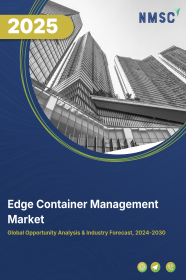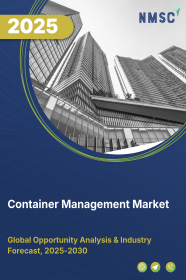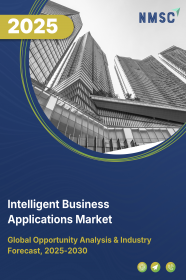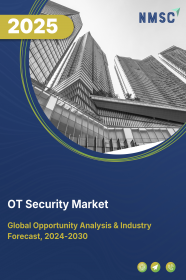
Edge Container Management Market by Component (Software and Services), by Deployment Model (On-Premises and Cloud Based), and by End Users (Energy & Utilities, Healthcare, Media & Entertainment, Retail, Telecom & IT, Transportation, and Others) – Global Opportunity Analysis and Industry Forecast 2024-2030.
US Tariff Impact on Edge Container Management Market
Trump Tariffs Are Reshaping Global Business
Edge Container Management Market Overview
The global Edge Container Management Market size was valued at USD 4.11 billion in 2023 and is predicted to reach USD 19.39 billion by 2030 with a CAGR of 24.8% from 2024-2030.
The edge container management market, also known as the edge container handling market, refers to the orchestration and administration of containerized applications at the edge of network, optimizing performance and resource utilization. This market involves solutions that enable businesses to deploy, manage, and scale containerized workloads in edge environments, allowing data processing closer to the source.
The key benefits include reduced latency, improved bandwidth efficiency, and enhanced security that are critical for industries demanding swift data processing and analysis.
In comparison to traditional cloud-based container management, edge solutions deliver quicker response times and lower data transfer costs, making them especially beneficial for businesses that depend on immediate insights and operational efficiency. Moreover, these solutions are essential for enabling innovative edge computing strategies and fostering digital transformation across various sectors.
Market Dynamics and Trends
The growth of the automotive sector drives the expansion of the market due to the increasing adoption of connected vehicles and the need for real-time data processing. This trend leads automotive companies to deploy edge computing solutions to efficiently manage data generated from various sources, such as sensors, GPS, and onboard diagnostics.
As per the report published in 2023 by the European Automobile Manufacturers Association (ACEA), the global car production reached 76 million in 2023, reflecting a rise of 10.2% compared to 2022. This increase in automotive production emphasizes the need for edge devices solutions to optimize data handling in connected vehicles.
Additionally, the rising telecom industry propels the edge container management market growth as the demand for low-latency services and real-time data processing increases. This surge in connectivity and mobile data consumption drives telecom companies to adopt container orchestration solutions that efficiently manage and analyse data closer to the source.
As per the latest report by the World Economic Forum, the global telecommunications market is projected to grow from USD 1.81 trillion in 2022 to USD 2.65 trillion by 2030, marking an 46.1% growth. This significant growth highlights the necessity for advanced solutions to handle the escalating data demands in telecom sector that in turn boosts the edge container management market expansion.
Moreover, the expansion of the e-commerce industry fuels the growth of the market due to the rising volume of online transactions that necessitates faster data processing and low-latency solutions.
According to the report of the International Trade Administration (ITA) published in 2024, the global B2C e-commerce revenue reached USD 4.19 trillion in 2024 and is projected to rise to USD 5.5 trillion by 2027, marking a 31.2 % growth within a span of 3 years. This upward trend reflects the growing necessity for efficient data management solutions to effectively manage data complexities and advance operational efficiency, thereby accelerating the market growth.
However, the data privacy and security concerns restrain the edge container management by increasing the risks of data breaches and compliance violations, that deter organizations from adopting these solutions.
On the other contrary, the integration of artificial intelligence (AI) in edge container management is expected to create significant growth opportunities for the market. This integration optimizes resources, automates deployment, and enhances reliability through predictive analytics, enabling organizations to achieve greater operational efficiency and effectively manage their environments.
Market Segmentation and Scope of the Study
The edge container management market report is segmented on the basis of component, deployment, end users, and region. On the basis of component, the market is classified into software and services. On the basis of deployment model, the market is divided into on-premises and cloud based.
On the basis of end users, the market is segmented into energy & utilities, healthcare, media & entertainment, retail, telecom & IT, transportation, and others. Regional breakdown and analysis of each of the aforesaid segments include regions comprising North America, Europe, Asia-Pacific, and RoW.
Geographical Analysis
North America dominates the edge container management market share and is projected to maintain its dominance throughout the forecast period. This is attributed to the rapid expansion of the telecom industry in the region that in turn increases the demand for low-latency services and real-time data processing.
According to the report from the Canadian Radio-Television and Telecommunications Commission (CRTC) published in 2022, the total revenues of the Canadian telecommunications sector increased by 3.5% from 2021, reaching USD 42.3 billion in 2022. This upward trend emphasizes the necessity for effective solutions to handle growing data volumes and enhance operational efficiency in the telecom sector.
Additionally, the growth of the healthcare sector in countries such as the U.S, Canada, and Mexico fuels market expansion, as advanced technologies such telemedicine and connected medical devices accelerates the need for efficient data processing and low-latency services.
As per the latest report published by the World Bank Group, the region's healthcare expenditure per capita accounted for USD 11,818 in 2022 compared to USD 10,088 in 2019, marking a growth of 17.1% in a period of 3 years. This surge highlights the pressing need for efficient data management solutions to enhance operational capabilities and improve patient care effectiveness.
On the other hand, Asia-Pacific is expected to show a steady rise in the edge container management market demand due to the significant growth of the automotive industry. The increasing production of connected vehicles drives the demand for efficient data processing and management solutions.
According to the report of the International Trade Administration (ITA) published in 2023, the domestic production of automobile in China is expected to reach 35 million vehicles by 2025. This expansion highlights the need for robust solutions to handle the growing data volumes and ensure seamless operations in the automotive sector.
Furthermore, the expanding e-commerce industry in the region propels market growth, as the rise in online transaction creates substantial volumes of data that necessitates efficient processing and management.
As per the report published in 2024 by the India Brand Equity Foundation, Indian e-commerce sales is projected to grow at a CAGR of 18.2% from 2021 to 2025, reaching USD 120.1 billion by 2025. This significant growth in e-commerce emphasizes the essential requirement for robust solutions to streamline data processing and improve operational efficiency, thereby fueling the market expansion.
Competitive Landscape
The edge container management industry comprises of various market players such as Microsoft Corporation, Google LLC, CDNetworks Inc, Thomas-Krenn.AG, Amazon Web Services (AWS), Inc., IBM Corporation, Akamai Technologies, Inc., Aarna.ml, Inc., Delta Electronics, Inc., Broadcom Inc., Red Hat, Inc., SixSq SA, Portainer, KubeEdge, SUSE and others. These market players are adopting various strategies including product launch and collaboration to stay competitive and maintain their market positions.
For instance, in September 2024, CDNetworks launched edge computing platform designed for small and medium-sized businesses (SMBs) that boosts operational efficiency by processing data closer to its source. This development enhances edge container management, enabling the efficient deployment of containerized applications and allowing SMBs to utilize real-time insights for streamlining operations.
Furthermore, in May 2024, MetTel collaborated with Thomas to enhance edge computing by integrating advanced technologies into edge networks. This integration aims to optimize container deployment while improving service delivery and operational efficiency.
Key Benefits
-
The report provides quantitative analysis and estimations of the edge container management industry from 2024 to 2030, which assists in identifying the prevailing market opportunities.
-
The study comprises a deep dive analysis of the current and future edge container management market trends to depict prevalent investment pockets in the market.
-
Information related to key drivers, restraints, and opportunities and their impact on the market is provided in the report.
-
Competitive analysis of the players, along with their market share is provided in the report.
-
SWOT analysis and Porters Five Forces model is elaborated in the study.
-
Value chain analysis in the market study provides a clear picture of roles of stakeholders.
Edge Container Management Market Key Segments
By Component
-
Software
-
Services
By Deployment Model
-
On-Premises
-
Cloud Based
By End Users
-
Energy & Utilities
-
Healthcare
-
Media & Entertainment
-
Retail
-
Telecom & IT
-
Transportation
-
Others
By Region
-
North America
-
The U.S.
-
Canada
-
Mexico
-
-
Europe
-
The UK
-
Germany
-
France
-
Italy
-
Spain
-
Denmark
-
Netherlands
-
Finland
-
Sweden
-
Norway
-
Russia
-
Rest of Europe
-
-
Asia Pacific
-
China
-
Japan
-
India
-
South Korea
-
Australia
-
Indonesia
-
Singapore
-
Taiwan
-
Thailand
-
Rest of Asia Pacific
-
-
RoW
-
Latin America
-
Middle East
-
Africa
-
Key Players
-
Microsoft Corporation
-
Google LLC
-
CDNetworks Inc
-
Thomas-Krenn.AG
-
Amazon Web Services (AWS), Inc.
-
IBM Corporation
-
Akamai Technologies, Inc.
-
Aarna.ml, Inc.
-
Delta Electronics, Inc.
-
Broadcom Inc.
-
Red Hat, Inc.
-
SixSq SA
-
Portainer
-
KubeEdge
-
SUSE
REPORT SCOPE AND SEGMENTATION:
|
Parameters |
Details |
|
Market Size in 2023 |
USD 4.11 billion |
|
Revenue Forecast in 2030 |
USD 19.39 billion |
|
Growth Rate |
CAGR of 24.8% from 2024 to 2030 |
|
Analysis Period |
2023–2030 |
|
Base Year Considered |
2023 |
|
Forecast Period |
2024–2030 |
|
Market Size Estimation |
Billion (USD) |
|
Growth Factors |
|
|
Countries Covered |
28 |
|
Companies Profiled |
15 |
|
Market Share |
Available for 10 companies |
|
Customization Scope |
Free customization (equivalent up to 80 working hours of analysts) after purchase. Addition or alteration to country, regional, and segment scope. |
|
Pricing and Purchase Options |
Avail customized purchase options to meet your exact research needs. |

















 Speak to Our Analyst
Speak to Our Analyst




















